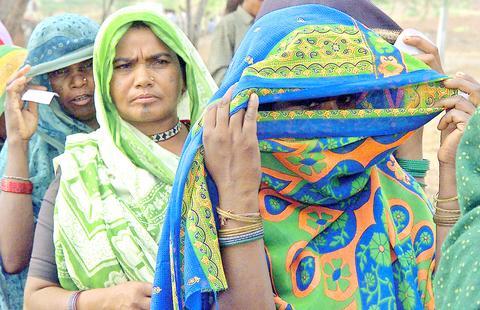Voters in the Himalayas lined up in heavy rain while counterparts in the arid Indian capital waited for their daily water delivery before heading to the polls in yesterday's fifth and final phase of parliamentary elections in the world's largest democracy.
Although exit polls and voter surveys placed Prime Minister Atal Bihari Vajpayee's National Democratic Alliance (NDA) far ahead of the main opposition Congress party and its allies, most pollsters have predicted that the 11-party coalition will fall short of the 272 seats it needs for a majority in the lower house of parliament, the Lok Sabha.

PHOTO: REUTERS
But polls and surveys have been wrong in previous Indian elections.
"It's still wide open," the Times of India said in a front-page headline.
Vajpayee's coalition, led by his Hindu nationalist party, has been bolstered by a booming economy, moves toward peace with rival Pakistan and pledges to further modernize India. Congress and its allies have campaigned for a more secular government and championed the rural poor, who they say have been left out of India's new prosperity.
Balloting was being held in 16 states yesterday, the last of five polling days spread over three weeks.
Overall results are expected on Thursday, when tallies of more than 350 million votes will be taken from millions of electronic voting machines that replaced paper ballots across India for the first time. The voter turnout has averaged 55 percent.
If the NDA fails to win a majority, it will be forced into horse-trading with smaller parties or independents to form a government. That raises the risk of an unstable government, which may not last a full term or be able to implement its policies.
The continuing peace process with nuclear-armed rival Pakistan is not expected to be influenced by the result, no matter who forms the next government.
"Everybody knows that the dividends of peace with Pakistan are huge and range from big cuts in defense spending to large gains from trade," the Times of India said.
Indian President A.P.J. Abdul Kalam was among the first to vote, showing off his ink-stained finger as proof, and commenting, "I feel beautiful to exercise my right to vote."
Sonia Gandhi, the Italian-born leader of the main opposition Congress party, voted early, behind a cardboard screen in a small side-room of a government building.
"Let the results come. We will see what happens after that," she said.
In the New Delhi suburb of Vasant Kunj, where water is scarce, voters waited for water deliveries before going to the polls.
"We have come to exercise our franchise only after making sure our tanks are filled," said air force Wing Commander S.C. Gupta.
He said politicians "come here seeking votes, but never address our perennial problem of acute water shortage."
In the Himalayan state of Sikkim, bordering China, heavy rains poured down, but, "There is tremendous enthusiasm for voting. Even the Buddhist monks have started turning out for voting much before the balloting began," said Tashi Bhutan, a community leader in Gangtok, capital of the Buddhist-majority state.
About 1 million troops were guarding polling booths, some carrying video cameras to discourage fraud and violence.

VAGUE: The criteria of the amnesty remain unclear, but it would cover political violence from 1999 to today, and those convicted of murder or drug trafficking would not qualify Venezuelan Acting President Delcy Rodriguez on Friday announced an amnesty bill that could lead to the release of hundreds of prisoners, including opposition leaders, journalists and human rights activists detained for political reasons. The measure had long been sought by the US-backed opposition. It is the latest concession Rodriguez has made since taking the reins of the country on Jan. 3 after the brazen seizure of then-Venezuelan president Nicolas Maduro. Rodriguez told a gathering of justices, magistrates, ministers, military brass and other government leaders that the ruling party-controlled Venezuelan National Assembly would take up the bill with urgency. Rodriguez also announced the shutdown

Civil society leaders and members of a left-wing coalition yesterday filed impeachment complaints against Philippine Vice President Sara Duterte, restarting a process sidelined by the Supreme Court last year. Both cases accuse Duterte of misusing public funds during her term as education secretary, while one revives allegations that she threatened to assassinate former ally Philippine President Ferdinand Marcos Jr. The filings come on the same day that a committee in the House of Representatives was to begin hearings into impeachment complaints against Marcos, accused of corruption tied to a spiraling scandal over bogus flood control projects. Under the constitution, an impeachment by the

Exiled Tibetans began a unique global election yesterday for a government representing a homeland many have never seen, as part of a democratic exercise voters say carries great weight. From red-robed Buddhist monks in the snowy Himalayas, to political exiles in megacities across South Asia, to refugees in Australia, Europe and North America, voting takes place in 27 countries — but not China. “Elections ... show that the struggle for Tibet’s freedom and independence continues from generation to generation,” said candidate Gyaltsen Chokye, 33, who is based in the Indian hill-town of Dharamsala, headquarters of the government-in-exile, the Central Tibetan Administration (CTA). It

China executed 11 people linked to Myanmar criminal gangs, including “key members” of telecom scam operations, state media reported yesterday, as Beijing toughens its response to the sprawling, transnational industry. Fraud compounds where scammers lure Internet users into fake romantic relationships and cryptocurrency investments have flourished across Southeast Asia, including in Myanmar. Initially largely targeting Chinese speakers, the criminal groups behind the compounds have expanded operations into multiple languages to steal from victims around the world. Those conducting the scams are sometimes willing con artists, and other times trafficked foreign nationals forced to work. In the past few years, Beijing has stepped up cooperation